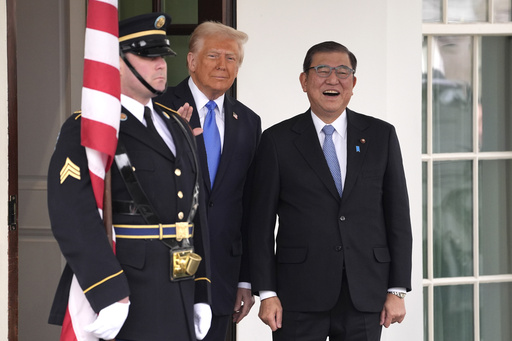
WASHINGTON — Japanese Prime Minister Shigeru Ishiba is actively preparing for his inaugural meeting with President Donald Trump, emphasizing the importance of establishing a strong personal relationship. This week, Ishiba consulted with prominent business leaders including SoftBank CEO Masayoshi Son and OpenAI CEO Sam Altman, who had previously engaged with Trump at the White House. He also sought guidance from his former colleague, Fumio Kishida, and even reached out to Shinzo Abe’s widow, reflecting on the connections built during Abe’s tenure, particularly over shared golf outings with Trump.
“I want our first in-person discussions to center on building trust between us,” Ishiba stated to reporters before his Washington trip, which is set for Friday. The task at hand is significant; replicating the bond between Trump and Abe, who resigned in 2020 and tragically passed away in 2022, is no small feat. However, Ishiba is prioritizing the creation of a solid relationship with the American leader.
Since taking office in October, Ishiba is one of the first global leaders to meet with Trump in his renewed presidency, following Israeli Prime Minister Benjamin Netanyahu’s recent visit. Arriving in Washington on Thursday evening, Ishiba is scheduled for a brief visit, expected to include a working lunch and a joint press briefing with Trump in the Oval Office.
During their discussions, Ishiba expressed admiration for Trump’s resilience, referencing an assassination attempt where Trump was shot during the campaign. The Japanese Prime Minister recognizes the necessity of ensuring the U.S.-Japan alliance remains robust amid Trump’s “America First” agenda, especially given geopolitical challenges from China and North Korea.
Trump’s agenda for their meeting reportedly includes discussions about joint military exercises, Japanese investments in the American economy, enhancements in cybersecurity, expanded space collaboration, and opportunities for technological advancements in areas such as artificial intelligence and semiconductors. Ishiba, in turn, aims to remind Trump of the historical and economic ties between the U.S. and Japan, noting that Japanese firms employ nearly one million Americans and have led in foreign direct investment in the U.S. for the past five years.
Despite these connections, the U.S. recorded over a $68 billion trade deficit with Japan in 2024, a point of concern highlighted by a senior administration official. This official noted Trump’s particular attention to trade deficits when assessing economic relationships.
Another key topic Ishiba might address is the proposed $14.1 billion acquisition of U.S. Steel by Japan’s Nippon Steel, which was recently blocked by President Biden due to national security concerns. While Ishiba may not initiate a discussion about the acquisition, he is prepared to advocate for Nippon should Trump raise the issue.
Nippon Steel and U.S. Steel are pursuing legal action to counter the acquisition’s blockage, asserting that this transaction aligns with Trump’s manufacturing focus by fostering U.S. investments and jobs.
Discussion concerning defense expenditure is also anticipated to feature prominently in their talks. Japan is committed to increasing its defense budget to 2% of GDP by 2027, fulfilling commitments similar to those made by NATO members, despite not being an official member. Trump has been pressuring NATO and other partners to amplify their defense spending even further, setting a formidable 5% target.
Ishiba may highlight Japan’s substantial support for the U.S. defense sector, earmarking significant funds for procuring advanced military equipment and systems, which could reassure Trump regarding Japan’s commitment to enhanced defense.
“I believe President Trump is receptive to discussions; hopefully, we can establish a positive rapport,” Ishiba remarked earlier. As part of his preparations, Ishiba has engaged with business leaders in the technology sector to bolster Japan-U.S. cooperation in artificial intelligence, a key area for future collaboration.
A former ambassador to Japan has voiced optimism regarding Ishiba’s efforts, suggesting that he sees this as a pivotal time to rekindle the strong ties that existed between Trump and Japan during the earlier presidential term. Abe was particularly unique among foreign leaders in fostering a close relationship with Trump, characterized by social gatherings and cultural exchanges that included golf outings and traditional Japanese events.
With Ishiba’s extensive background in diplomacy and an understanding of the significance of personal rapport, he might consider revisiting golf—an activity that once served as a key diplomatic bridge, as suggested by the former ambassador at a recent event in Washington. The connection made during such engagements could prove beneficial in his pursuit of a closer relationship with Trump.

